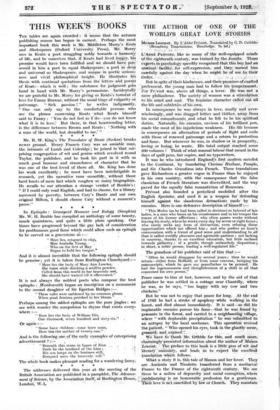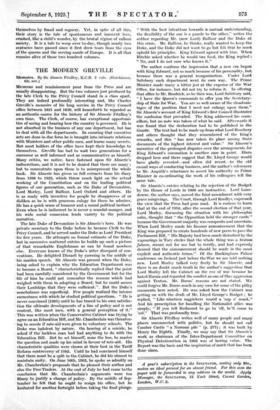THE AUTHOR OF ONE OF THE - WORLD'S GREAT LOVE
-.STORIES Manna Lescaut. By. L'Abb4 Prevost._ Translated by G. D. Cribble;
- (Broadivay Translations. Routledge. W.) '
L'Arink-.PREVoSr, _like- so many of.the well-equipped minds of,the eighteenth century, was trainedhy.the Jesuits. Those exnerts.iiiPsyehology _weedily recognized that, this boy had an tiiaisnal: for- self7expression; and they.; ;nursed him catefully against _the- day "when he- might: be of use_ to their Ordpr. : 411 "..
But .in_spite of their kindnesses, and their promises of-exalted
preferment, the young man had to follow his Vmperament.
For Pr.fATOst was, above all things, a lover. - He was not a mere philanderer. The society of women was a stimulation
to his mind and soul.' The feminine character called out all . _
the life and subtleties of his own.
In consequence. he was always in love, madly and over- whelmingly,-and wasS-dragged hither and thither, away from his social coMmitmenti_and what he felt to be his spiritual
duties. Naturally, his enemies, envious of his brilliant, pen, made the most Of his injudicious weakness. His life became in consequence an alternation of periods of flight and exile with those of renewed patronage and a return to protection and fame. But wherever he was, in shadow or in prosperity, loving or losing; he wrote. His total output reached some 200 volumes ! Think of what manual labour that meant in the days of quill pens, fair copies, and no typewriters.
It was he who introduced England.'s first modem novelist to the Continent, by translating Clarissa* Hariowe, Panifla, and Sir Charles Grandison into French. These translations gave Richardson a greater vogue in France than he, enjOyed in his own country,' with the consequence that the 'false classicism of French literature was discredited; and the way paved for the equally false romanticism of Rousseau.
Prevost also. founded a periodical modelled after the English Spectator, and used it as - a Weapon for - defending himself _ against the slanderous detractions made' by his enemies. 7Here is one defensive description of himself :— " This Medor (as he had been called in derision) so beloved of fair ladies, is a man who bears on his countenance and in his'temper the traces of his former afflictions ; who often passes weeks without -leaving his study, where he workoevery day for seven-or eight-hours ; who rarely , seeks any form of distraction, even refusing - thiise bpportunitiee which are offered him ; and who prefers an hour's conversation with a friend of good sense and unclerstanding- to All that is called-worldly pleasures and agreeable. pastime ; not lacking in courtesy, thanks to an excellent education, but little inclined towards gallantry ; of a gentle; though melancholy -disposition ; 'in short, a Sober person, leading' a Well--regtilated life."
The grandson of his publisher said of him that :7-- -• " Often he would disappear for several -years ; then he would return—eitherfrom Hollered, or -limn some convent, brinking' his nittinitscripts; which he .gave my grandfather to be printed. - He had the ingenuousness and thoughtlessness of a child in all that concerned his own person."
Peace came to him at last, however, and by the aid of that publisher he was settled in a cottage near Chantilly, where
he was, as he says, " too happy with my cow_ and two chickens."
But he was not to enjoy that peace for long. At the end
of 1763 he had a stroke of apoplexy-while walking in the forest, and died almost immediately. It is said—so did his implacable enemies pursue his fame—that he was found by peasants in the forest, and carried to a neighbouring village, where " with deplorable precipitation " he was submitted to
an autopsy by the local sawbones. This operation revived
the patient, " Who opened his eyes, took in the ghastly scene, groaned; We have to thank Mr. @flblile for this and much more charniinglY"Prese-nted information about the author of 'Mc/hen 'thcaut. The Pieface_tothiS boOk is a little gem of wit and literatiCstiliinilify, and leads to expect the excellent translation 'which follows. • Whit a story it is, this tale of Manon and her -lover. They are AueasSin and Nicolette transferred from a mediaeval France to the France of the eighteenth century. We see them in a milieu of depravity and social corruption, where Cardsharping is an honourable profession fora gentleman, ciHeir love is nit sanctified by law or Church. They maintain
themselves by fraud and roguery. Yet, in spite of all this, their story is the tale of spontaneous and innocent love, crushed, like a child's wonder, by the brutal regime of callous society. It is a tale to weep over to-day, though nearly two centuries have passed since it first drew tears from the eyes of the queens and the serving maids of Europe. It is all that remains alive of those two hundred volumes.











































 Previous page
Previous page